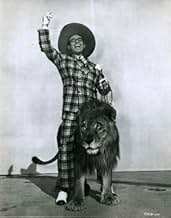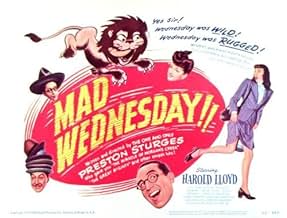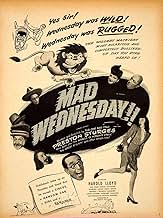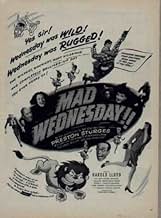NOTE IMDb
6,3/10
1,8 k
MA NOTE
Ajouter une intrigue dans votre langueHarold is a mild-mannered clerk who dreams about marrying the girl at the desk down the aisle. But then he loses his job, and when he is offered a potent drink at a bar, he goes on a very st... Tout lireHarold is a mild-mannered clerk who dreams about marrying the girl at the desk down the aisle. But then he loses his job, and when he is offered a potent drink at a bar, he goes on a very strange and funny rampage (with a lion in tow).Harold is a mild-mannered clerk who dreams about marrying the girl at the desk down the aisle. But then he loses his job, and when he is offered a potent drink at a bar, he goes on a very strange and funny rampage (with a lion in tow).
- Réalisation
- Scénario
- Casting principal
- Récompenses
- 2 nominations au total
Avis à la une
A strange film. Written and directed by the brilliant filmmaker Preston Sturges, and starring silent film comedian Harold Lloyd (about 20 years after his prime), this movie tells the story of a college football hero who settles into a rut as he reaches middle age. Suddenly fired from his dead-end job, the milquetoasty Mr. Diddlebock uses his severance money to break out of his rut, embark on a series of adventures over a wild two or three days alongside a chance acquaintance, the aptly named Wormy (played by Sturges regular Jimmy Conlin), and pursue the woman of his dreams.
Even though this film lacks some of the subtlety, sophistication and polish of some of Preston Sturges' earlier work, it nevertheless (in true Sturges fashion) hides away some pretty heady ideas about growing old, taking chances, and living life to the fullest. this film, a minor entry in the Sturges catalog, would have been the crowning achievement in the career of anyone else. Watch this one, if only to find out what Harold really did on Wednesday!
Even though this film lacks some of the subtlety, sophistication and polish of some of Preston Sturges' earlier work, it nevertheless (in true Sturges fashion) hides away some pretty heady ideas about growing old, taking chances, and living life to the fullest. this film, a minor entry in the Sturges catalog, would have been the crowning achievement in the career of anyone else. Watch this one, if only to find out what Harold really did on Wednesday!
The last laugh of any great clown is interesting, if only for its memento mori value. Laurel & Hardy's last film, UTOPIA, is sadly botched but moments of their grand comedy still flair up, like Marc Antony's final bravery in Shakespeare's Antony & Cleopatra. The grandiose W.C. Fields still holds his own in SONG OF THE OPEN ROAD, even though he was deathly ill with alcohol poisoning. The Marx Brother's LOVE HAPPY is mainly a vehicle for one last pantomime fling for brother Harpo -- and all the more poignant for it. Chaplin's KING IN NEW YORK is a splendid idea -- we chuckle at its conception -- though Chaplin conducts himself like a department store floorwalker more than a comedian. And Harold Lloyd's last movie seems to me to be a nostalgic conspiracy between him and director Sturges, a Last Hurrah to remind movie audiences one last time of the glorious slapstick & pantomime heritage that America was in the process of losing forever as the old clowns faded from the scene and brash lunatics like Martin & Lewis or Bob Hope took over the reins of comedy. Lloyd's film exists in several differently edited versions, but I won't call any of them "butchered", just misunderstood. By the late Forties there weren't any skilled editors around who could quite understand the cadence, the beat, the nearly-balletic timing that a great clown brought to the camera and needed the editor to highlight -- such things as double-takes, long shots of the chase and just stationary shooting when the clown is unfolding a gag. Lloyd produced a novel, a War & Peace, if you will, of vintage gags -- his editors only understood short stories or magazine articles. They grew nervous when the camera lingered on anybody or anything. But great comedy is just that -- lingering. In his final film Lloyd wants to loiter over gags silly and profound. His dawdling is cut short and the truncated comedy that follows seems at times stiff and childish. But before Harold is relegated to the dusty shadows he still pulls off much nonsense that is both genial and brassy -- not a coming attraction, but a dignified retreat back to the Land of Belly Laughs. Anyone grounded in American cinematic comedy feels abit like one of the children in the story of the Pied Piper; we wish we could go with him back into that wonderful, magical, mountain.
Between 1940 and 1944, Preston Sturges wrote and directed some of the best film comedy ever produced. His eight movies for that short period are all good, and it would not be an exaggeration to say that four of the eight have the touch of brilliance.
This sequence of movies came to an end when Sturges left Paramount following what he legitimately saw as increasing interference by studio bosses. His high stature at the studio hadn't prevented two of his movies from being taken out of his hands and re-cut against his wishes, one of which - The Great Moment - was never restored to the movie Sturges intended.
At this point, Sturges declined to join a rival studio, and instead formed a partnership with Howard Hughes, hoping to protect his future movies from the interference he could see was becoming more common within the studio system. However, for a combination of reasons, this partnership with Hughes was not a success, and the only film Sturges produces in that period - The Sin of Harold Diddlebock - shows a decline in his work.
The whole look and sound of the movie is inferior. It is impossible to know whether this decline was the result of an inevitable burn-out in his ability after such sustained success, or the absence of support and quality control that Paramount had applied to the benefit of the wonderful movies that had come before.
So... to "Diddlebock" itself! It is difficult to identify why it isn't as funny as we might expect. The film was created as a star vehicle for Harold Lloyd, and by all accounts his comedy instincts did not match those of Sturges. As much as Stuges tried, clearly such a big talent and personality as Lloyd was never going to completely submit to direction with which he didn't agree, and there must be some evidence of that in what we see on screen.
There is a complete lack of the 'sparkle' we have come to expect. The familiar faces around Lloyd remind us of the great Sturges movies, but to me this is like an inferior pastiche of a Sturges movie by a lesser hand, without such a reliable instinct for film comedy. But perhaps that describes what Preston Sturges had become in such a short time.
This sequence of movies came to an end when Sturges left Paramount following what he legitimately saw as increasing interference by studio bosses. His high stature at the studio hadn't prevented two of his movies from being taken out of his hands and re-cut against his wishes, one of which - The Great Moment - was never restored to the movie Sturges intended.
At this point, Sturges declined to join a rival studio, and instead formed a partnership with Howard Hughes, hoping to protect his future movies from the interference he could see was becoming more common within the studio system. However, for a combination of reasons, this partnership with Hughes was not a success, and the only film Sturges produces in that period - The Sin of Harold Diddlebock - shows a decline in his work.
The whole look and sound of the movie is inferior. It is impossible to know whether this decline was the result of an inevitable burn-out in his ability after such sustained success, or the absence of support and quality control that Paramount had applied to the benefit of the wonderful movies that had come before.
So... to "Diddlebock" itself! It is difficult to identify why it isn't as funny as we might expect. The film was created as a star vehicle for Harold Lloyd, and by all accounts his comedy instincts did not match those of Sturges. As much as Stuges tried, clearly such a big talent and personality as Lloyd was never going to completely submit to direction with which he didn't agree, and there must be some evidence of that in what we see on screen.
There is a complete lack of the 'sparkle' we have come to expect. The familiar faces around Lloyd remind us of the great Sturges movies, but to me this is like an inferior pastiche of a Sturges movie by a lesser hand, without such a reliable instinct for film comedy. But perhaps that describes what Preston Sturges had become in such a short time.
Harold Lloyd was one of Hollywood's greatest physical comedians and actors of Buster Keaton and Charlie Chaplin generation. This film marks his final performance but he could have done so much more in film. Regardless, his contributions should not be overlooked. Harold Lloyd plays Harold Dibbledock, a former football players, who ends up at a dead-end job as a clerk for 22 years. His ungrateful boss sends him packing after he fires him for years of service which was more like a prison sentence than a job. He never relived his glory days on the field. When he encounters an old man who seeks a few dollars to play the horses, he begins a new life after he takes a drink. Until then, Harold has never drank alcohol. He awakens up to learn that he's changed and doesn't have a clue about it. Margaret Hamilton plays Flora in a small performance. Anyway, he learns that he's bought a cab with a driver and a horse and a circus. Anyway, the film's best scenes are stolen by Jackie, the lion. It's a good film!
An interesting if ultimately unsuccessful combination of two clashing comedy styles (overseen by humorless mogul Howard Hughes no less), this film turned out to be Harold Lloyd's swan-song - and, as such, it ended on a somewhat positive note (even though the film was made during Sturges' period of decline).
It opens with a reprise of the climactic football game from one of Lloyd's greatest successes, THE FRESHMAN (1925), eventually bringing that same character (albeit renamed!) up to date. Still, in the end, the film is more Sturges than Lloyd: even if the star plays one of his trademark roles of a patsy (though not without the occasional display of ingenuity), there is little of the star's characteristic slapstick here. Instead, the comedy is in Sturges' typical frantic (and, mainly, dialogue-driven) style - with which Lloyd isn't entirely comfortable; the film also features Sturges' stock company of character players in full swing. That said, it's climaxed by yet another of the star comedian's thrilling set-pieces which finds him overhanging from a building-ledge - hampered this time around by a myopic Jimmy Conlin and an understandably disgruntled circus lion!
While a disappointing whole (it was re-issued in 1950 in a shortened version renamed MAD Wednesday), the film does contain a number of undeniable gems: his romantic attachment to every female member of one particular family (all of whom happen to work for the same firm over a 20-year period); his first encounter with Conlin, with the two of them exchanging wise sayings (the optimistic Lloyd had kept a handful nailed to the wall behind him at his former workplace) in order to explain their current dejected state-of-mind; and, best of all, the unforgettable scene in which Lloyd takes his first alcoholic beverage (an impromptu concoction by bartender Edgar Kennedy and which he names "The Diddlebock") that invariably provokes an unexpected yet hilarious reaction.
It opens with a reprise of the climactic football game from one of Lloyd's greatest successes, THE FRESHMAN (1925), eventually bringing that same character (albeit renamed!) up to date. Still, in the end, the film is more Sturges than Lloyd: even if the star plays one of his trademark roles of a patsy (though not without the occasional display of ingenuity), there is little of the star's characteristic slapstick here. Instead, the comedy is in Sturges' typical frantic (and, mainly, dialogue-driven) style - with which Lloyd isn't entirely comfortable; the film also features Sturges' stock company of character players in full swing. That said, it's climaxed by yet another of the star comedian's thrilling set-pieces which finds him overhanging from a building-ledge - hampered this time around by a myopic Jimmy Conlin and an understandably disgruntled circus lion!
While a disappointing whole (it was re-issued in 1950 in a shortened version renamed MAD Wednesday), the film does contain a number of undeniable gems: his romantic attachment to every female member of one particular family (all of whom happen to work for the same firm over a 20-year period); his first encounter with Conlin, with the two of them exchanging wise sayings (the optimistic Lloyd had kept a handful nailed to the wall behind him at his former workplace) in order to explain their current dejected state-of-mind; and, best of all, the unforgettable scene in which Lloyd takes his first alcoholic beverage (an impromptu concoction by bartender Edgar Kennedy and which he names "The Diddlebock") that invariably provokes an unexpected yet hilarious reaction.
Le saviez-vous
- AnecdotesDuring the scene where Harold Lloyd's character meets Jackie the lion, on the first take when Lloyd pets Jackie, the lion actually bit him on his right hand. However, he was not injured because the lion's teeth scraped against his two prosthetic fingers (Lloyd had lost most of his right hand in an on-set accident in 1919). After that, he refused to pet the lion ever again on- or off-screen, and in the second take, which was used for the film, his terrified squirming over the lion standing next to him is genuine.
- GaffesThe story takes place in New York. It is odd to see Los Angeles City Hall in the background of the final shot.
- Crédits fous"... and for the first time a young girl called Frances Ramsden playing the youngest Miss Otis"
- Versions alternativesOriginally released at 90 minutes; was then re-edited and re-released in a shorter 79-minutes version under the title "Mad Wednesday" in 1950.
- ConnexionsEdited from Vive le sport! (1925)
- Bandes originalesAmerica, the Beautiful
(uncredited)
Music by Samuel A. Ward
Played during the presidential calendar montage
Meilleurs choix
Connectez-vous pour évaluer et suivre la liste de favoris afin de recevoir des recommandations personnalisées
- How long is The Sin of Harold Diddlebock?Alimenté par Alexa
Détails
- Date de sortie
- Pays d’origine
- Langue
- Aussi connu sous le nom de
- The Sin of Harold Diddlebock
- Lieux de tournage
- Memorial Stadium - Stadium Rim Way, Berkeley, Californie, États-Unis(football scenes edited from The Freshman)
- Société de production
- Voir plus de crédits d'entreprise sur IMDbPro
Box-office
- Budget
- 1 712 959 $US (estimé)
- Durée1 heure 29 minutes
- Couleur
- Rapport de forme
- 1.37 : 1
Contribuer à cette page
Suggérer une modification ou ajouter du contenu manquant

Lacune principale
By what name was Oh quel mercredi! (1947) officially released in Canada in English?
Répondre





































